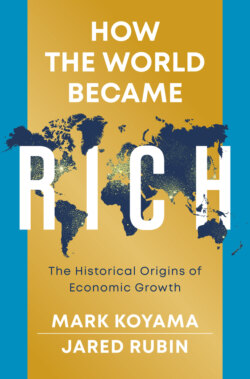How the World Became Rich

Реклама. ООО «ЛитРес», ИНН: 7719571260.
Оглавление
Mark Koyama. How the World Became Rich
CONTENTS
List of Tables
List of Illustrations
Guide
Pages
Dedication
How the World Became Rich. The Historical Origins of Economic Growth
Preface
1 Why, When, and How Did the World Become Rich?
What Is Economic Growth?
Measuring the Past
What Will You Learn from This Book?
What This Book Does Not Do
2 Did Some Societies Win the Geography Lottery?
Geography and Modern Development
Mountains, Coasts, and Climate
Geography and Transport Infrastructure
Geography and Industrialization
Chapter Summary
3 Is It All Just Institutions?
What Are Institutions?
Property Rights
The Legal System
Political Institutions
More Equal Rights for All
Institutions and the Commercial Revolution
Between the State and the Market: Guilds
Parliaments and Limited Government
War and State Finances
Chapter Summary
4 Did Culture Make Some Rich and Others Poor? What Is Culture and Why Does It Matter?
Can Culture Explain the European Take-off?
Does Religion Affect Economic Growth?
The Protestant Work Ethic and the “Spirit” of Capitalism
If Not a Work Ethic, Why Did Protestant Countries Grow Faster?
The Reformation and Religion as a Source of Political Legitimacy
Is Islam the Cause of Middle Eastern Economic Stagnation?
The Long-Term Persistence of Culture
The North–South Italy Divide
The Persistence of Trust Norms
Gender Norms
Chapter Summary
5 Fewer Babies?
Malthusian Pressures
The Black Death
Household Formation and the European Marriage Pattern
Did the EMP Spur Economic Growth?
Reasons for Skepticism
Demographic Change and the Transition to Modern Economic Growth
Chapter Summary
6 Was It Just a Matter of Colonization and Exploitation?
How Did the Colonizers Benefit?
The Slave Trades
The Resource Grab
Some Silver Linings of Colonialism?
Public Goods and Education
Missionaries
Chapter Summary
7 Why Did Northwestern Europe Become Rich First?
How Geography Shaped Institutional Development
Why Was There No Medieval European Take-off?
Divergence within Europe Just before the Take-off
Parliaments and the Rise of Limited, Representative Government
Chapter Summary
8 Britain’s Industrial Revolution
A Consumer Revolution
Capitalist Agriculture
Do Political Institutions Explain Britain’s Industrialization?
Mercantilism and Empire
Does the Transatlantic Slave Trade Explain Britain’s Industrialization?
Was It Cotton?
Was It Market Size?
How About State Capacity?
Maybe It Was Skilled Mechanical Workers?
An Innovative Economy
High Wages and Induced Innovation
An Enlightened Economy
Chapter Summary
9 The Rise of the Modern Economy
The Fruits of Industrialization
The Second Industrial Revolution
The Demographic Transition
The Uneven Diffusion of Modern Economic Growth
How the US Became Rich
The Soviet Detour
Chapter Summary
10 Industrialization and the World It Created
Delayed Catch-up: The Shadow of Colonization (and Other Factors)
How Japan Became Rich
How the East Asian Tigers Became Rich
How China Is Becoming Rich
Chapter Summary
11 The World Is Rich
References
Index
A
B
C
D
E
F
G
H
I
J
K
L
M
N
O
P
Q
R
S
T
U
V
W
X
POLITY END USER LICENSE AGREEMENT
Отрывок из книги
Mark: For Desiree.
Jared: To my father, Thom, and the memory of my mother, Linda.
.....
The answer to the question “How did the world become rich?” must explain where, when, and how human societies were able to achieve sustained economic growth. The where and the when we know the answer to: northwestern Europe and North America, in the early to mid-19th century. All of the metrics we discussed above agree on this point. It is the third question – how did the escape from stagnation happen – that is so vexing.
Understanding the origins of wealth is one of the most important pursuits of the social sciences, and for this reason it has been the center of much debate. The purpose of this book is to present and distill this debate. Ultimately, any credible hypothesis must be able to account for a number of facts. First, modern, sustained economic growth is the result of sustained technological innovation. Britain in the late 18th century experienced such a spate of innovations during the period known as the Industrial Revolution. Initially, economic growth was slow to follow. But unlike earlier episodes of economic growth, it did not peter out. By the mid-19th century, the rate of both innovation and economic growth accelerated as industrialization and structural economic change spread to other parts of the world. Why did this process first take hold in Britain? Why in the 18th century? Why not in some other part of the world? Second, Europe was an economic, technological, and cultural backwater around 1000 CE. What changed in that continent that allowed it to pull ahead of China, India, and the Middle East, all of which at one point had societies well ahead of even the most advanced societies in Western Europe?
.....